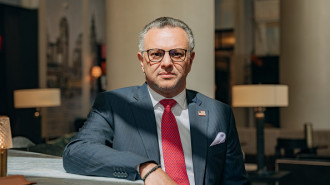The Italian public has been avidly following the story of 11-year-old Alvin, who was born in Italy to Albanian parents, since it emerged last month he was living in a Kurdish-held camp in northeastern Syria.
A media report aired in October showed the emotional reunion between the boy and his father in the Al-Hol camp housing thousands of family members of suspected IS fighters.
A spokesman for the International Federation of the Red Cross and Red Crescent Societies (IFRC) said an Albanian boy was in the Lebanese capital on Thursday on his way back from Al-Hol to his father in Italy.
"This started five years ago with the mother kidnapping the child, and deciding to go and fight for IS," Tommaso Della Longa told AFP.
After years of fighting, Syria's Kurds hold thousands of suspected foreign IS members in detention camps: men and women, but also some 8,000 children - more than half of whom are under the age of five.
The United Nations says hundreds of them are unaccompanied.
IFRC said the Albanian boy's mother was killed in fighting.
But "we discovered through a message from Al-Hol camp that the boy was still alive", said Della Longa.
With the backing of Italian and Albanian authorities and after negotiations in the Syrian capital, the IFRC was handed over the Albanian child on Wednesday in the first such repatriation via Damascus.
"Our Syrian Red Crescent volunteers escorted the boy from Al-Hol to Damascus," the spokesman said.
"We took the kid under our responsibility, and today we arrived in Beirut."
International powers have warned of mass IS breakouts from Al-Hol, as well as other Kurdish-run camps and jails, in the wake of a deadly Turkish cross-border offensive on October 9.
The Albanian boy's return home is the first such known handover since the start of the attack, which has seen Syria's Kurds cosy up to Damascus after years of seeking semi-autonomy.
The Kurdish authorities have repeatedly called for Western countries to repatriate their nationals linked to IS, but they have been largely reluctant.
Austria, Germany, France and Belgium, however, have brought a handful of orphans home, while the United States has repatriated several women and their children.
Kazakhstan, Uzbekistan and Kosovo have repatriated dozens of women and children.
Follow us on Twitter: @The_NewArab

![Palestinians mourned the victims of an Israeli strike on Deir al-Balah [Getty]](/sites/default/files/styles/image_684x385/public/2024-11/GettyImages-2182362043.jpg?h=199d8c1f&itok=xSHZFbmc)


![The law could be enforced against teachers without prior notice [Getty]](/sites/default/files/styles/image_684x385/public/2178740715.jpeg?h=a5f2f23a&itok=hnqrCS4x)
 Follow the Middle East's top stories in English at The New Arab on Google News
Follow the Middle East's top stories in English at The New Arab on Google News


